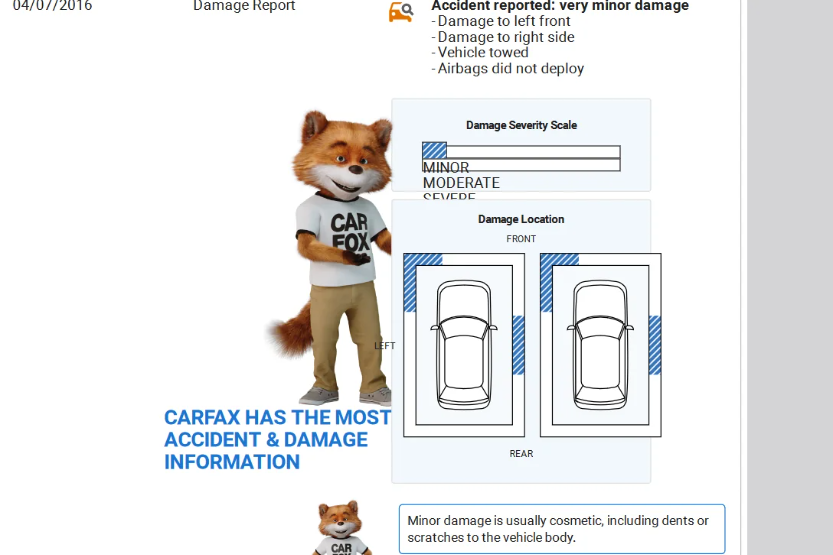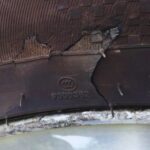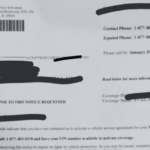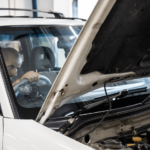Carfax is a popular tool that provides detailed information about a vehicle’s history. One of the most important things that Carfax reports is whether a vehicle has been in an accident.
However, not all accidents are created equal, and some may be listed as “minor damage” on a Carfax report. In this article, we will explore what “minor damage” means on a Carfax report and how it can affect the value of a vehicle.
According to Carfax, “minor damage” refers to damage that does not affect the safety, reliability, or functionality of a vehicle.
This can include things like small dents, scratches, or cosmetic damage. While these types of damage may not seem like a big deal, they can still impact the value of a vehicle.
For example, if a car has multiple scratches or dents, it may not look as appealing to potential buyers, which could result in a lower resale value.
On the other hand, if a car has been in a major accident, it may have structural damage that affects its safety or reliability, which could significantly reduce its value.
What Does Minor Damage Mean on Carfax?

Carfax is a popular vehicle history report provider that offers detailed information about a vehicle’s past. One of the sections on the Carfax report is the damage section, which provides information about any damage that the vehicle has sustained throughout its life.
Minor damage on Carfax refers to any damage that has been reported to the vehicle but is not deemed significant enough to affect the car’s overall structural integrity or safety.
Examples of minor damages as interpreted by Carfax includes scuffs, small bumps, dents, or broken side mirrors and headlights. Generally, these incidences do not interfere with the car’s normal functioning and do not affect the car’s ability to operate safely.
It is important to note that the term “minor damage” can vary in severity and type. Some minor damages may require only minor cosmetic repairs, while others may require more extensive repairs.
However, in general, minor damage on Carfax does not indicate any significant issues with the vehicle.
If a vehicle has a minor damage reported on its Carfax report, it may still be a good option for buyers who are looking for a vehicle that is in good condition.
However, it is important to note that minor damage can still impact the car’s value, and buyers should take this into consideration when making their purchasing decisions.
In conclusion, minor damage on Carfax refers to any damage that has been reported to the vehicle but is not deemed significant enough to affect the car’s overall structural integrity or safety. While these incidents may not seem like a big deal, they can still impact the car’s value.
Buyers should carefully review a vehicle’s Carfax report and take into consideration any reported damages before making their purchasing decisions.
Decoding a Carfax Report
As per The Bear Lot (.com), a Carfax report contains a wealth of information about a vehicle’s history, including accident history, odometer readings, title information, lemon history, maintenance work, and more.
When reading a Carfax report, it is important to know how to interpret the information presented.
One of the most important sections of a Carfax report is the accident history.
This section provides details about any accidents the vehicle has been involved in, including the date of the accident, the severity of the damage, and whether or not the airbags deployed.
It is important to note that not all accidents are reported to Carfax, so a clean report does not necessarily mean that the vehicle has never been in an accident.
Another important section of the Carfax report is the odometer readings. This section provides a detailed history of the vehicle’s mileage, including the date and mileage reading of each reported odometer reading.
This information can be used to determine if the vehicle has been driven more or less than what the odometer currently reads.
The title information section of the Carfax report provides details about the vehicle’s title status, including whether or not it has a branded or salvage title. A branded title is a title that has been designated as salvage, junk, rebuilt, or flooded.
A salvage title is issued when a vehicle has been declared a total loss by an insurance company. A rebuilt title is issued when a salvage vehicle has been rebuilt and is now roadworthy. A flooded title is issued when a vehicle has been damaged by water.
In addition to the above sections, the Carfax report may also include information about lemon history, maintenance work, and more. It is important to carefully review the entire report to ensure that you have a complete understanding of the vehicle’s history.
Overall, decoding a Carfax report can be a daunting task, but with a little knowledge and understanding, it is possible to make an informed decision when purchasing a used vehicle.
Impact of Minor Damage on Used Cars

When it comes to buying a used car, the vehicle’s history is an important factor to consider. A Carfax report can provide valuable information about the car’s past, including any accidents or damage it has sustained.
Minor damage is one such category that is often reported on a Carfax report. In this section, we will explore how minor damage can impact the resale value and price of a used car.
Effect on Resale Value
Minor damage can have a significant effect on the resale value of a used car. According to Carfax, a car with minor damage can see an average hit of $500 to its retail price. This is because even minor damage can make potential buyers wary of the car’s condition and history.
If the damage is not repaired properly, it can also affect the car’s appearance and functionality, further lowering its resale value.
Influence on Price
Minor damage can also influence the price of a used car. In some cases, a car with minor damage may be offered at a cheaper price than a similar car with no reported damage. However, it is important to note that this is not always the case.
The price of a car with minor damage will depend on various factors, including the severity of the damage, the repairs that were made, and the overall condition of the car.
When considering a used car with minor damage, it is important to weigh the potential savings against the potential risks.
While a cheaper price may be tempting, it is important to ensure that the damage has been properly repaired and that there are no underlying issues that could affect the car’s safety or performance.
In summary, minor damage can have a significant impact on the resale value and price of a used car. While a car with minor damage may be offered at a cheaper price, it is important to carefully consider the potential risks and ensure that the damage has been properly repaired.
Identifying Types of Minor Damages
When it comes to buying a used car, it is important to know the condition of the vehicle you are interested in. One way to get a sense of its history is by checking the Carfax report. This report will detail any accidents or damages that the car has experienced in the past.
However, not all damages are created equal. Here are some types of minor damages that you might encounter on a Carfax report.
Cosmetic Damages
Cosmetic damages are those that affect the appearance of the car but do not impact its functionality. They may include scratches, dents, or paint damage. These types of damages are often caused by minor accidents or parking lot mishaps.
While they may not affect the car’s performance, they can be unsightly and may lower the car’s resale value.
Hidden Damages
Not all damages are immediately visible. Some may be hidden beneath the surface, such as rust or frame damage. Rust can eat away at the metal of the car and compromise its structural integrity. Frame damage can also weaken the car’s structure and make it less safe to drive.
These types of damages may not show up on a Carfax report, so it is important to have a trusted mechanic inspect the car before making a purchase.
When looking at a Carfax report, it is important to pay attention to the types of damages that are listed. Some minor damages, such as scratches or dings, may not be cause for concern.
However, if the report lists any damages that could affect the car’s safety or performance, such as rust or frame damage, it is important to proceed with caution.
Importance of Inspection and Repair

When considering purchasing a used car with minor damage reported on a Carfax report, it is important to have a trusted mechanic inspect the vehicle before making a purchase decision.
This is because minor damage may not always be visible to the untrained eye, and a mechanic can provide a more thorough inspection of the vehicle to ensure that it is in good condition.
If the vehicle has been repaired, it is also important to ensure that the repairs were done correctly and to a high standard. This can be done by taking the vehicle to a reputable body shop that has experience with the make and model of the car.
While minor damage may not have a significant impact on the overall performance of the vehicle, it can still affect its value and safety. For example, a damaged bumper or fender may not affect the car’s ability to drive, but it can still be an eyesore and decrease the vehicle’s resale value.
In summary, it is crucial to have a trusted mechanic inspect the vehicle and ensure that any repairs were done correctly before purchasing a used car with minor damage reported on a Carfax report. This can help ensure that the vehicle is in good condition and worth the investment.
Recognizing Red Flags
When reviewing a CARFAX report, it’s important to keep an eye out for red flags that may indicate potential issues with the vehicle. Here are some common red flags to look out for:
Lemon
A “lemon” is a term used to describe a vehicle that has repeated defects that cannot be fixed. If a vehicle has a lemon title, it means that the manufacturer has bought it back from the owner due to these defects.
This can be a red flag as it may indicate that the vehicle has underlying issues that cannot be fixed.
Total Loss
A total loss title means that the vehicle has been declared a total loss by an insurance company. This can occur if the cost to repair the vehicle exceeds its value, or if the vehicle has been damaged beyond repair.
If a vehicle has a total loss title, it may be a red flag as it may indicate that the vehicle has been in a serious accident.
Flood Damage
If a vehicle has been in a flood, it may have sustained significant damage that may not be immediately apparent. Flood damage can cause corrosion, electrical issues, and other problems that can be difficult to detect.
If a vehicle has a flood damage title, it may be a red flag as it may indicate that the vehicle has underlying issues that may be expensive to fix.
Minor Damage
While minor damage may not be a red flag in and of itself, it’s important to review the details of any reported damage to ensure that it has been properly repaired. Minor damage can include things like small dents, scratches, or broken mirrors.
If a vehicle has a history of minor damage, it’s important to ensure that the repairs have been made properly and that there are no underlying issues.
Overall, it’s important to review a CARFAX report carefully and to keep an eye out for any red flags that may indicate potential issues with the vehicle. By doing so, buyers can make informed decisions and avoid purchasing a vehicle that may have underlying problems.
Choosing the Right Used Car

When it comes to buying a used car, there are several factors to consider. One of the most important factors is the car’s history. A Carfax report can provide valuable information about a car’s past, including any accidents or damage it may have sustained.
If you’re looking for an affordable and reliable used car, it’s important to choose one with a clean Carfax report. However, if you come across a car with minor damage on its Carfax report, it may still be a viable option.
Minor damage typically refers to any damage to a car that does not significantly affect the car’s ability to operate safely. If the damage has been properly repaired, the vehicle may still be in good condition and provide reliable transportation for years to come.
It’s important to thoroughly inspect a used car, regardless of its Carfax report. Different states have different laws regarding the disclosure of damage, so it’s possible for a car to have sustained damage that was not reported on its Carfax report.
Inspecting the car yourself or having a trusted mechanic inspect it for you can help you identify any potential issues.
When choosing a used car, it’s also important to consider your own needs and preferences. Do you need a car with good gas mileage? Do you need a car with plenty of cargo space? Do you prefer a certain make or model?
By considering these factors, you can narrow down your options and find a used car that meets your specific needs and budget.
In summary, choosing the right used car involves considering the car’s history, inspecting it thoroughly, and considering your own needs and preferences. While a clean Carfax report is ideal, a car with minor damage may still be a viable option if the damage has been properly repaired.
Selling a Car with Minor Damage
As per Market Watch, when it comes to selling a car with minor damage, it’s important to be transparent with potential buyers. Carfax reports can reveal any accidents or damage that a car has experienced, so it’s best to disclose any minor damage upfront to avoid any surprises later on.
While minor damage may not significantly affect the resale value of a car, it’s still important to take steps to ensure that the car is in good condition before putting it up for sale. This includes getting any necessary repairs done and ensuring that the car is functioning properly.
When selling a car with minor damage, it’s also important to consider the resale value. According to Carfax, minor damage can cause a hit to the retail price of a used car, with an average impact of about $500. However, this impact can increase significantly for a vehicle with severe damage in its past.
To maximize the resale value of a car with minor damage, it’s important to take steps to make the car as appealing as possible to potential buyers. This includes thoroughly cleaning the car, addressing any cosmetic issues, and providing documentation of any repairs that have been done.
You know, as someone who’s picked up a few used cars, I can vouch for this: selling a car with a bit of wear and tear isn’t rocket science. Just be straight-up about any dings and dents, and make sure your ride is in decent shape.
By doing that, you’re gonna reel in potential buyers and score a fair deal when it’s time to say goodbye to your wheels. It’s all about being honest and keeping that resale value up!
Final Thoughts
In summary, when buying a used car, it’s important to review the Carfax report to ensure that the vehicle has not been involved in any significant accidents or suffered major damage. However, minor damage reported on a Carfax report may not necessarily be a deal-breaker.
Minor damage can include cosmetic repairs such as scuffs, small dents, or broken headlights. These types of repairs may not impact the overall performance or safety of the vehicle.
In fact, purchasing a car with minor damage on a Carfax report may be more affordable than a car with a clean history report.
It’s important to note that if the damage has been properly repaired, the vehicle may still be in good condition and provide reliable transportation for years to come. However, it’s crucial to thoroughly inspect the vehicle before making a purchase and to ensure that the repairs were done correctly.
Overall, while minor damage on a Carfax report may not be a major concern, it’s always best to exercise caution and do your due diligence when purchasing a used car.


![Honda Brake Fluid [What You Need to Know] Honda Brake Fluid](https://roadsumo.com/wp-content/uploads/2022/02/Honda-brake-fluid-150x150.jpg)






